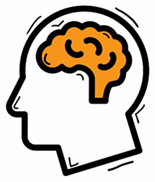The teenage years are the biggest period of brain development for your child since babyhood.
The brain has to become more efficient and begin its journey to adult functioning. The well used brain connections become stronger, the ones that are not needed are pruned away.
 The changes begin during puberty and continue until mid 20’s. As with all body changes and stages of development - the pace is different for everyone.
The changes begin during puberty and continue until mid 20’s. As with all body changes and stages of development - the pace is different for everyone.
Whilst these changes are happening you are likely to see changes in behaviour. Teenagers tend to challenge boundaries, sleep more, and have the mood changes we expect at this age. It is often not an easy time and it can be hard for parents and carers to know what support to offer.
Understanding the changes in teenage brains during adolescence can help you and them, understand their sometimes difficult behaviour.
What's Happening In The Teenage Brain?
During the teenage and young adult years, the brain starts the sorting and tidying of its connections.
It starts from the back of the brain working to the front.
Teenagers have to rely more on the middle bit of their brain, called the amygdala, more than adults do. This bit of the brain relies a lot on ‘gut feeling’ and on instinct. The fight or flight response is in here.
Fight or flight causes young people to be more reactive, they act first and think later and are likely to make mistakes. Parents and carers can help young people slow things down and think actions through. If they have made a mistake getting them to rewind what happened and see where they could have made a different decision can help them make a better choice next time.
Risk Taking
Teenage brains are thrill seekers! Taking risks is part of young people trying new things and stepping out of their comfort zone.
It is an important part of development, but can create risky situations. Teenagers are even more likely to take risks when with friends - peer pressure can be very powerful.
Try to listen more than you talk – this will help give your child the space to think of the pros and cons of their decisions to help to keep them safe. If they feel like you are listening carefully to their point of view they are more likely to be able to take your views on board.
Relationships
Teenagers are extra sensitive to feelings of hurt or rejection. Relationships with friends and family can be more difficult for them. It may look like they are overreacting to something that has happened with their friends, but they feel the hurt very much.
What might seem unimportant to an adult can feel heart breaking to a young person. Knowing how to manage difficult feelings takes time and the teenage brain still has a lot to learn. It can help when;
You may have noticed that your teenager doesn’t talk to you as much at the moment. This is normal it is an important part of the move to independence. It won’t last forever try not to be hurt when friends seem more important than family. Your child is doing what is expected at this age.
You may feel like you are no longer needed by your child and this can be hard. Your role is still vital. Teenagers really need you there to guide them, help them keep safe and to let them know they are loved and important to you. Your child may push against your rules and boundaries.
Try not to give your child a long list of things they need to do or remember. Their memory is still developing and it will frustrate you both when they don’t manage it. Keep instructions short or write a list they can tick off.
Praise is still a really important part of parenting a teen. Tell them when you notice them making good decisions and trying their best. They may not seem obviously pleased with your praise but will know you think positively about them and feel pride. This will help their self esteem and self confidence.
Sleep
Sleep patterns change during puberty. The sleep hormone (called melatonin) gets released later at night in teenagers (about 10pm for adults and about 1am for teenagers).
This means teenagers often get to sleep later and want to get up later too. It is a biological change and they cannot help it. Unfortunately it does not always fit in with school and family life. It can be the cause of a lot of arguments as parents try to get teenagers to get up on time and settle down at a reasonable bedtime too.
Encourage your child to:
Shelf Help Books
Books about mental health for 13 to 18 year olds, with advice and information about issues like anxiety, stress and OCD, bullying and exams.
All Shelf Help books can be reserved for free from any Norfolk library, or online. The books are available to borrow for up to six weeks.
Suggestions:
You can contact the Healthy Child Programme by calling Just One Number on 0300 300 0123 or texting Parentline on 07520 631590. Our opening hours are 8am-6pm Monday-Friday (excluding bank holidays) and 9am-1pm on Saturdays.
If you are 11-19 you can text ChatHealth on 07480 635060 for confidential advice from one of our team.
You can speak to other Norfolk parents and carers by clicking our online community forum below.